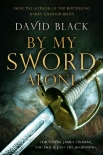By My Sword Alone David Black (best story books to read txt) 📖

- Author: David Black
Book online «By My Sword Alone David Black (best story books to read txt) 📖». Author David Black
‘Not a one, captain. Not a one.’
‘Then there are things I would like to explain, excellency …’ said Poinatowski, all brisk, and smiling now himself, before James interrupted him.
‘If we are to sit here drinking all night, while you give me, your colonel, a lesson in war, then I think it is only fitting you feel uncomfortable too. No more “excellency” now. We talk as men.’
‘James,’ said Poinatowski pointedly, with his complicit grin again, ‘there is nothing I can tell you now that can ever really prepare you for what will happen tomorrow, but there are things you should know about battle anyway … truths you should know so that you will not be distracted when you encounter them. In other words, a brief description of what a modern clash of armies is really like. Because it is always very easy to be distracted on a battlefield, something that can end most unfortunately. So let us begin at the beginning. You will already know that where there is an army, there is also a manual. Every state, every prince, who fields an army, has one, and they exist so no soldier has to think.’
James nodded that he was following. Poinatowski continued. ‘The consequence is that a modern battlefield has become a very mannered, stylised arena, or at least would appear so, if you could see it. But you can’t. No-one can, not even if he were lifted up by an angel to look down upon it. Because of all the smoke. Gunpowder makes a lot of smoke. In fact, smoke is the guns’ principal manufacture. More than death. It blankets everything, right from the opening cannonade. Great, clinging, stinking clouds of it, so that in the thick of battle it grits up your eyes and you can almost chew it.’
But, said Poinatowski, all that happened after the shooting started. Before it, there was much James might expect to see; before all the smoke got in the way. ‘The whole extravaganza is more akin to a courtly gavotte than a fight, and it all begins with the approach to battle,’ said the captain.
‘A general marches his soldiers onto the field, and then he must deploy them, from column of march into lines, hopefully without any interference from the enemy, for that would be impolite. The infantry, in battalions, usually forms up three deep and in the centre of the general’s line; the cavalry in squadrons, also three deep, but to the side, protecting the infantry’s flanks. The artillery, in batteries of seldom more than three guns, are then be run up between the battalions to take up positions usually about half a dozen paces in front.
‘Long before all that, of course, the general’s orders would have been written out and carried by aides to all his units ... so everybody knows what is, generally, to be expected of them. Because,’ added Poinatowski, more pointedly, ‘from the moment the general orders his artillery to open fire, he generally has very little control over what happens after that.’
‘The smoke gets in the way?’ asked James.
‘The smoke, indeed,’ said Poinatowski. ‘And the noise. Don’t forget the noise. Sometimes the din is so great you can blow a bugle sounding recall until you are purple in the face, and no-one hears a damn thing.’
Poinatowski paused to gulp his brandy, then resumed. ‘After a brief cannonade, the infantry battalions whose written orders say they must go forward, start to march, in their rigid lines, towards the enemy lines, which are, by custom, a mirror image of their own. They perform such manoeuvres with parade-ground regularity, the sergeants keeping the fronts straight with their halberds. Until they come within musket range of the enemy line, then they stop, the front rank kneels, and fires. The second rank fires over them and the third rank, over the second rank’s shoulders. It goes without saying, the enemy ranks return their fire, and thusly they both continue until one side breaks and runs away. But none of this you see …’
‘… because of the smoke,’ said James.
‘Again, indeed,’ said Poinatowski. ‘And that, in essence, is a modern battle. A machine for delivering firepower to the enemy. It is very rare they will fix bayonets, and even rarer will they charge. These are peasant soldiers, most of them, devoid of imagination, but not so devoid that they will stand in line to face a naked blade if their delivery of firepower fails. A cavalry charge in a modern battle is even rarer.’
‘I do not understand,’ interrupted James. ‘I would have thought the shock of a regiment of cavalry hitting you would …’
But Poinatowski interrupted, in his turn. ‘Cavalry seldom fight in regiments. Mainly because there is rarely the room for them to deploy. A modern battlefield is usually a small arena, otherwise what minimum control a general might have would be lost altogether. No. The manuals agree cavalry must number off into squadrons, free to range the battlefield plugging gaps. A wise general will always hold them back to head off any enemy flanking attempts or breakthroughs, always assuming his opponent is clever enough, or lucky enough to be able to assemble such a movement in the confusion of battle. The defending general will then counter by using his cavalry as mobile infantry. Trotting them up to within range of the threat, where they can open fire with their carbines, either from horseback, or in the case of dragoons like us, they will dismount and form an infantry line of their own. Think on it. In a pitched battle, any cavalry squadron deciding to charge a line of infantry would be riding





Comments (0)